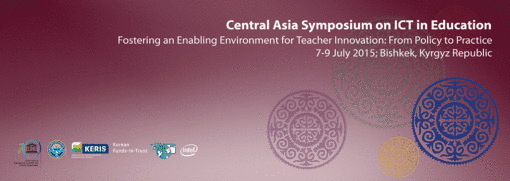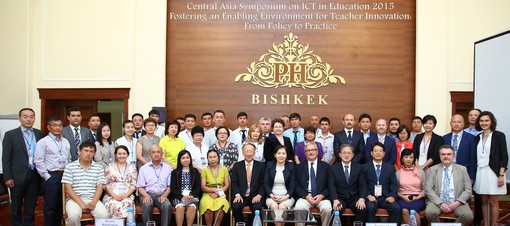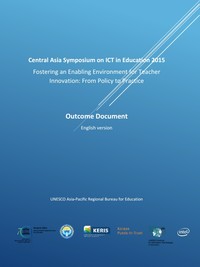CENTRAL ASIA SYMPOSIUM ON ICT IN EDUCATION 2015; Fostering an Enabling Environment for Teacher Innovation: From Policy to Practice, 7-9 July 2015, Bishkek, Kyrgyz Republic
7-9 July 2015 | Bishkek, Kyrgyz Republic
Since 2011, UNESCO Asia and the Pacific Regional Bureau for Education (UNESCO Bangkok) has organized the Central Asia Symposium on ICT in Education (CASIE) as a sub-regional platform for the Member States to collectively deliberate on possible solutions to the issues at hand, with a particular focus on integrating technologies into the education systems.
In reference to the Outcome Document of CASIE 2014 held in Tashkent, Republic of Uzbekistan, participants expressed their enthusiasm for a further exchange of promising practices, shared issues and challenges, and continued collaboration and partnerships on promoting effective use of ICT in Education. To sustain this sub-regional momentum, UNESCO Bangkok, in collaboration with the Korea Education and Research Information Service (KERIS), UNESCO Almaty, UNESCO Institute for Information Technologies in Education (IITE), and National Commission for UNESCO of the Kyrgyz Republic, will be organizing this year’s CASIE in Bishkek, Kyrgyz Republic on 7-9 July 2015.
Building on the discussions from the previous year’s symposium, CASIE 2015 will continue to examine policies, strategies, and initiatives to address the growing need for systematic teacher education and professional development in Central Asia as well as for the effective integration of ICT in teaching and learning. This is aligned with the proposed educational target on teachers for the Post-2015 Development Agenda, as stated in both the global Muscat Agreement and Bangkok Statement for the Asia Pacific region: by 2030, efforts must be made by all governments to ensure that all learners are taught by qualified, professionally trained, motivated, committed, and well-supported teachers who use appropriate pedagogical approaches (Muscat Agreement and Bangkok Statement). This is consistent likewise with the Sustainable Development Goals from the Rio+20 Conference that underscored the role of teachers in the provision of a good education as part of the “Future We Want”. Furthermore, the Bangkok Statement emphasized the huge potential of ICT in achieving the post-2015 education agenda. CASIE 2015 comes on the heels of the World Education Forum (WEF), to be held in May 2015, where the post-2015 education goals and targets will be formalized.
CASIE 2015 will continue to explore the teachers’ role as key agents in “changing the culture of learning”, as pointed during CASIE 2013, while taking into account an array of factors that enable them to utilize ICT in an educationally relevant and holistic manner. To this end, some key questions need to be considered: Have competency standards been clearly defined to guide teacher training curriculum and practice? Have these been clearly articulated among stakeholders to enable proper implementation and smooth transition from pre-service to in-service? What types of resources and support are needed to motivate teachers? Is data being collected and used appropriately to support teaching practice? How can we work together to replicate promising initiatives and overcome challenges discussed during CASIE 2014, among others?
It is in this context that CASIE 2015 calls for a collective effort of various stakeholders from policy, research, and practice to reflect on current conditions, and share their perspectives on creating and sustaining an empowering environment for teachers. With the theme “Fostering an Enabling Environment for Teacher Innovation: From Policy to Practice”, the Symposium seeks to address related aspects, including:
- Relevant continuous teacher professional development, with a focus on the continuum from pre-service to in-service training. This would include an analysis of the current state of TEIs, as well as overall professional development realities and possibilities for improvement of teacher training practices. Additionally, e-learning can be explored as an alternative mode of training and continuous professional development for teachers.
- Role of school leaders and overall institutional capacity building in establishing and sustaining a conducive environment for teachers. As teachers do not teach in a vacuum, creating and sustaining a supportive and innovative environment in schools is central to teacher success. When developing educational policies, schools and their roles in supporting teachers should be taken into account, as teacher performance relies greatly on these factors.
- Available and sharable resources and content for teachers. Through content development as well as exploration of Open Educational Resources for each country and the region, teachers could greatly benefit from ideas and resources available. Exchange and sharing of content could promote collaboration, decrease the workload, and allow teachers to spend more time on skills development and innovative teaching practices.
- Effective and efficient gathering and use of data to guide teaching practice as well as consequent educational policy development and evaluation. From teacher level, EMIS could reduce the administrative workload that is often time consuming. Providing evidence-based feedback to teachers, this information on performance and needs can be shared with policy makers who can then utilize the data to improve policies and support schools as well as teachers. EMIS can help define shortcomings as well as successes in the classroom, providing micro- and macro- level view of schools and educational systems. Additionally, learning analytics can be used to track students’ progress, providing real-time assessment and feedback of each student and classroom.
Through various formats, such as plenary and break-out workshop sessions, the Symposium will serve as an opportunity for the Central Asian countries to further explore the issues surrounding teacher training and support to mainstream holistic use of ICTs in pedagogy at the ground level. A new addition will be the daily reflective sessions that will bring together participants at all levels, including policy makers, international and national experts in ICT in Education, teacher educators, and Ministerial officials to discuss shared and individual challenges to initiate partnerships. Additionally, these reflection sessions will bring together various stakeholders to share perspectives on suitable policies and programmes for teachers. Collectively, this format would aim to encourage a link among policy, research, and practice.
A new noteworthy feature of the CASIE 2015 is to convene a special session where all participating member states and international experts collectively formulate a long-term (e.g. 3 to 5 years) strategic action plan for the sub-region to achieve the effective integration of ICT in education. A special emphasis will be given to implementation strategies to harness the potential of ICT in enhancing teacher training, as well as developing plans to systematically capacitate teachers in using ICT to support innovative pedagogy.
This planning session will outline the concrete country and regional goals, timeline, development and implementation processes, achieved individually or in collaboration. Moreover, a possibility of a Central Asian OER repository should be explored and considered as a long term goal for the region.
This overall roadmap would allow for a country and regional level plan in terms of ICT in Education. At the subsequent CASIEs, each member state will report their progress against the agreed action plan, as a way to showcase concrete results, promote cooperation, as well as share and cross-fertilize success factors, challenges and lessons learned.
Objectives
CASIE aims:
- To provide a platform for national education policy makers, practitioners and development partners to share issues and challenges that Central Asian countries are facing in integrating ICT into the education systems, with particular emphasis on the use of ICT for teacher empowerment with and for technology;
- To promote collaboration and partnerships among the Central Asian countries in the identification of solutions in response to similar issues and challenges toward effective and efficient use of ICT in Education.
- To provide an opportunity for all participating member states to formulate a long-term strategic planning document, outlining the measures and required actions necessary for the mainstreaming of ICT-enhanced innovative pedagogy.
Theme
With the main theme “Fostering an Enabling Environment for Teacher Innovation: From Policy to Practice”, the Symposium will address the following subthemes:
- Comprehensive teacher development policy and programmes for quality and relevance
- School leadership for a conducive and sustainable environment for teachers
- Digital resources for teachers (to include the proposed establishment of the Central Asian Open Educational Resources (OER) repository)
- Roles of EMIS and education data in monitoring and enhancing policy and practices in school teaching
Date and Venue
7-9 July 2015 (3 days) in Bishkek, Kyrgyz Republicn
Language of the Symposium
Russian and English with simultaneous translation in both languages
Participants
- Participating countries: Republic of Kazakhstan, Kyrgyz Republic, Mongolia, Republic of Tajikistan, Turkmenistan, and Republic of Uzbekistan. More participants from the host country and other countries can be accepted upon review and approval by the Organizers, their attendance being at their own expense.
- Four participants from each of the six countries: 1) Policy Maker (e.g. head of department or above), 2) Head of ICT-in-Education Division, 3) Head of Teacher Training Division (continuous professional development for in-service teachers), 4) Curriculum Head from the lead pre-service Teacher Education Institute
- Officials from the Ministry of Education of the Republic of Korea
- Experts from UNESCO and other international organizations
- Partner representatives from the private sector
Expected Outputs
A CASIE 2015 Outcome Document will be produced and disseminated, to include:
- Session Synthesis Reports
- A compilation of Case Studies on ICT-enabled School Innovations
- Policy Recommendations from workshop
- Follow-up activities for cooperation
- A 3 to 5- year strategic planning document for all participating member states
Contacts
The Symposium is organized by UNESCO Bangkok and Almaty Office, with the Secretariat located in UNESCO Bangkok.
UNESCO Contacts
- Ms Jonghwi Park, Programme Specialist, ICT in Education, UNESCO Bangkok, j.park@unesco.org
- Ms Auken Tungatarova, Programme Assistant, ICT in Education, UNESCO Bangkok, a.tungatarova@unesco.org
- Ms Aigul Khalafova, Education Officer, UNESCO Almaty, a.khalafova@unesco.org
Contacts in the Kyrgyz Republic
- Ms Bermet Chalakeyeva, Administrative Officer, the Secretariat of National Commission for UNESCO of the Kyrgyz Republic, kyrgyznatcomunesco@gmail.com
- Ms Saltanat Azarova, Education Officer, the Secretariat of National Commission for UNESCO of the Kyrgyz Republic, kyrgyznatcomunesco@gmail.com
Presentations
Keynote presentations:
◊ Post-2015 Global Education Agenda (Mr Gwang-Jo Kim, Director, UNESCO Asia Pacific Regional Bureau for Education) - pdf, 1.2mb
◊ ICT in Education: A powerful enabler and equalizer (Mr Peck Cho, Distinguished Professor, the Center for Teaching and Learning, Dongguk University, Republic of Korea) - pdf, 3.1mb
Country Reports: Progress since CASIE 2014: Successes and challenges
UNESCO synthesis of country status from the pre-symposium surveys (Ms. Jonghwi Park, Programme Specialist, ICT in Education, UNESCOUNESCO Asia Pacific Regional Bureau for Education, Bangkok, Thailand)
♦ Country Report: Kazakhstan - pdf, 740kb
♦ Country Report: Kyrgyz Republic - pdf, 530kb
♦ Country Report: Mongolia - pdf, 2.1mb
♦ Country Report: Uzbekistan - pdf, 620kb
Plenary Session 1: Comprehensive teacher development policy and programmes for quality and relevance
♦ ICT competency standards for teachers: Uzbekistan case (Mr Kozimbek Gafurov, First Deputy Director, Center for Development of Multimedia General Education Programmes, Ministry of Public Education, Republic of Uzbekistan) - pdf, 400kb
♦ Pre-service training: Singapore ICT in Education Masterplan and Corresponding Pre-service Teacher Preparation through Technological, Pedagogical and Content Knowledge (TPACK) (Mr Chai Ching Sing, Associate Professor, the Learning Sciences and Technologies Academic Group, National Institute of Education, Republic of Singapore) - pdf, 270kb
♦ In-service training: E-learning as an alternative delivery mode of training and continuous professional development for teachers (Mr Jinsun Yoo, Research Fellow, KERIS, Republic of Korea) - pdf, 400kb
Plenary Session 2: School leadership for a conducive and sustainable environment for teachers
♦ The imperatives of school leadership and mentoring in fostering teacher innovation: Intel Education Leadership in the 21st Century (Ms Tatiana Nanaieva, CIS Corporate Affairs Director, Intel CIS) - pdf, 5.8mb
♦ A regional competency framework for excellent school leadership (Ms Lilibeth Taa, Senior Officer, SEAMEO INNOTECH) - pdf, 1.4mb
♦ A journey to ICT-pedagogy integration: A school leader’s perspective (Ms Sharihan Baygunakova, Director, the UNESCO Associated School at Kazakh-American University, Republic of Kazakhstan) - pdf, 470kb
Plenary Session 3: Digital resources for teachers
♦ Open Education Developments in Kyrgyzstan (Ms Gulzada Urgunalieva, Project Coordinator, Roza Otunbayeva Initiative, Kyrgyz Republic and Lira Samykbaeva, Freedom of Information Program Manager, SOROS Foundation) - pdf, 6.4mb
♦ National online platform for collaborative teaching: The Virtual Learning Environment in Malaysia (Mr Teoh Boon Hai, Principal Assistant Director, Technology Education Division, Ministry of Education, Malaysia) - pdf, 1.3mb
♦ Deliver the Promises of OER for Post-2015 Education Agenda (Mr Fengchun Miao, Programme Specialist in ICT – Sector Policy Advice and ICT in Education, UNESCO Headquarters) - pdf, 660kb
Plenary Session 4: Roles of EMIS and education data in enhancing policy and supporting teachers
♦ ICT in education statistics: Supporting effective policymaking in Central Asia (Mr Peter Wallet, Assistant Programme Specialist, Communication and Information Unit, UNESCO-UIS) - pdf, 1.3mb
♦ The role of ICT standards in improving teacher training and data collection for monitoring ICT teaching (Ms Gulnara Dzhunushalieva, Director of SPCE, University of Central Asia) - pdf, 800kb
♦ Role and relevance of EMIS in policy decision at macro and micro levels (Mr Bakhtiyor Safarov, ICT in Education Specialist, Ministry of Education and Science, Republic of Tajikistan) - pdf, 530kb




